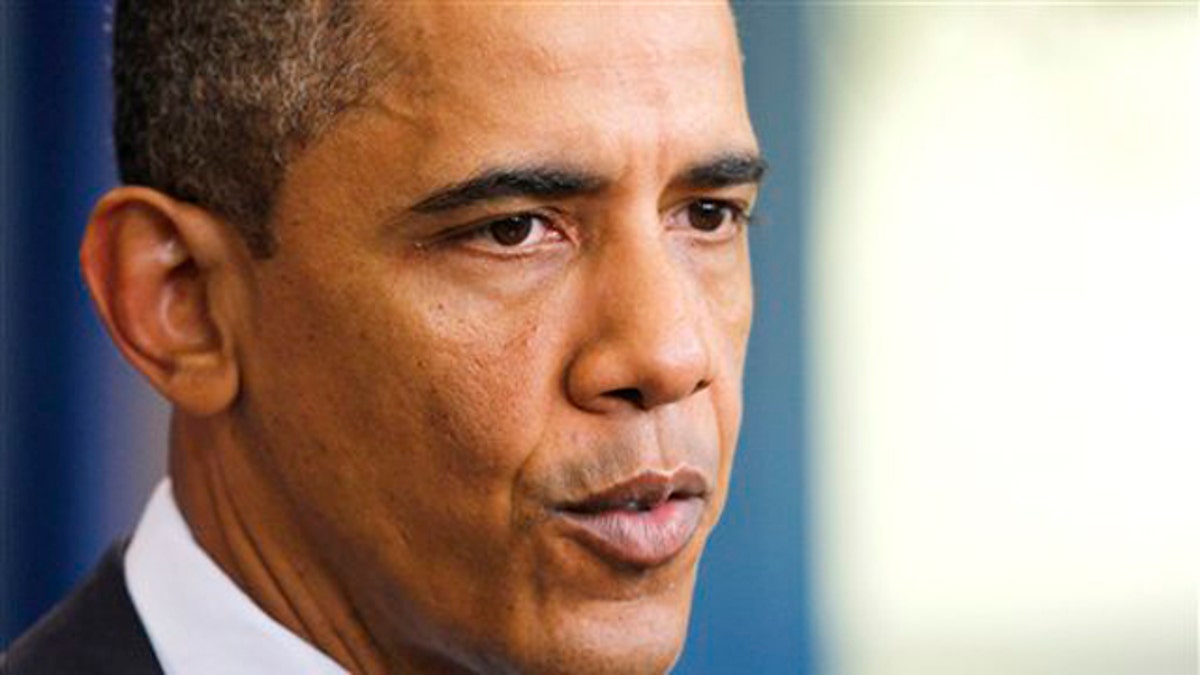
President Obama talks about the ongoing budget negotiations July in the briefing room at the White House. (AP)
Saying Democrats and Republicans agree they "have to get this done," President Obama indicated that deficit-reduction talks are back on track as he described a sit-down Thursday morning with top congressional leaders as "very constructive."
Republicans who participated in the meeting were tight-lipped but described it as productive. Obama discussed the meeting briefly Thursday afternoon, and, in a sign talks are in a better place than they were when GOP leaders walked away from the table last month, said aides and lawmakers will be working over the weekend on the issue ahead of another summit Sunday.
Obama said negotiators came to the meeting Thursday in the "spirit of compromise" and suggested they are prepared to make sacrifices.
"Everybody acknowledges that there's going to be pain involved politically on all sides," he said.
Obama, who noted that both sides are still "far apart" on many issues, said he hopes Sunday's meeting will pave the way for the "hard bargaining" necessary for a deal.
A handful of officials on both sides of the aisle have indicated they're ready to give ground. The White House is offering up potential changes to Social Security, though Press Secretary Jay Carney insists that's not a new position. House Republican Leader Eric Cantor also opened the door to discussing tax "loopholes" -- though he reiterated Republicans do not want any net increase in taxes.
"If he wants to talk about loopholes, we don't like loopholes and preferences," Cantor told Fox News. He said, however, that if Democrats want to eliminate them, they'll have to offset the changes with tax cuts elsewhere.
"We're not for any net new revenue right now," Cantor said. "Our line in the sand is we're not raising taxes on families or businesses right now."
Cantor was one of the eight congressional leaders huddling late Thursday morning with Obama and Vice President Biden as all sides try to break an impasse in long-running budget talks. Republicans want to see significant spending cuts as a condition for raising the $14.3 trillion debt ceiling. Ahead of an Aug. 2 deadline, GOP leaders have so far balked at Democratic efforts to blend a mix of tax increases into a deficit-reduction deal.
But as Obama suggests Republicans are holding up the deal over resistance to ending tax breaks for corporate jet owners and other select classes, Cantor said that's just "not the case."
Cantor was responding to comments Obama made Wednesday, when he accused Republicans of putting a "gun" against the heads of Americans to preserve tax breaks.
"The debt ceiling should not be something that is used as a gun against the heads of the American people to extract tax breaks for corporate jet owners or oil and gas companies that are making billions of dollars," Obama said during a town hall that featured questions posed through the online social network Twitter.
Cantor stressed that the tax breaks Obama is talking about would save billions, not trillions. But Cantor's comments reflected important, if nuanced, flexibility by Republicans. His earlier position was that closing loopholes should wait for a comprehensive overhaul of the tax code. And he didn't rule out using loophole revenues to extend existing tax cuts instead of paying for new ones.
In the Senate, however, Republican leader Mitch McConnell was against the idea. "To sort of cherry pick items in the context of this current negotiation at the White House strikes me as pretty challenging," he said.
According to sources on Capitol Hill, several options have been floated in talks with the White House -- including the possibility of closing loopholes and eliminating deductions in exchange for lowering individual and corporate rates. Talks have also included possible reforms to all three major entitlement programs, Fox News has learned.
Cantor said Thursday he was heartened that the White House apparently has opened the door to discussing Social Security reforms, in addition to changes to Medicare and Medicaid.
Democratic officials allied with Obama said the president believes it would be easier to win bipartisan support in Congress for a deal that embraces larger deficit cuts closer to the $4 trillion over 12 years that Obama proposed in April.
The officials, speaking on the condition of anonymity because of the delicacy of the talks, said the precise number was still in flux, but they said Obama would be making the case for more, rather than less deficit reduction, in his discussions with congressional leaders Thursday.
However, any larger figure would depend on agreement on a long-term deficit or spending cap, enforced by automatic spending cuts and, under Obama's proposals, a tax-increase "trigger" that would be tripped if targets were not met. Negotiators within the Biden-led group on the idea of spending caps and tax triggers had reached an impasse, however, a Republican aide familiar with the talks said.
Thursday's session comes several days after Obama and Republican House Speaker John Boehner met secretly at the White House to try to end political posturing and get negotiations back on track.
In fact, according to both Democrats and Republicans familiar with the Biden discussions, the two sides had reached tentative understandings that could easily add up to almost $2 trillion -- or even more -- in budget cuts over the coming decade. The agreements were tentative at best but involved more than $1 trillion in cuts to the day-to-day budgets of both domestic Cabinet agencies and the Pentagon, in addition to cuts to farm subsidies, federal employee pensions, college aid and federal health care programs.
The Associated Press contributed to this report.




